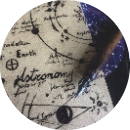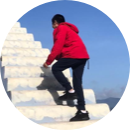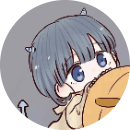Các câu hỏi tương tự
IV. Choose the correct verb form in the brackets1. When I (had / was having) a bath, someone (knocked / was knocking) the door2. The rain (started / was starting) when I (went / was going) to the library3. This time last Sunday I (walked / was walking) on this street4. When I (saw / was seeing) Mr. Brown, he (drank / was drinking) coffee5. Their parents (visited / were visiting ) the Statue of Libery while they (went / were going) shooping6. I (met / was meeting ) an old friend while I (walked /...
Đọc tiếp
IV. Choose the correct verb form in the brackets
1. When I (had / was having) a bath, someone (knocked / was knocking) the door
2. The rain (started / was starting) when I (went / was going) to the library
3. This time last Sunday I (walked / was walking) on this street
4. When I (saw / was seeing) Mr. Brown, he (drank / was drinking) coffee
5. Their parents (visited / were visiting ) the Statue of Libery while they (went / were going) shooping
6. I (met / was meeting ) an old friend while I (walked / was walking ) along the street
II. Give the correct words in the blanks: 1. When I was a boy, I (not use to)............................................. play game. 2. The film was (bore)…….………………… nothing happened.3. I am (interest)……………………….…… in English lessons.4. There are many (culture)............................................. differences between the two communities.5. There were lively New Year (celebrate)........................................ all over the town.6.What is the best horror mo...
Đọc tiếp
II. Give the correct words in the blanks:
1. When I was a boy, I (not use to)............................................. play game.
2. The film was (bore)…….………………… nothing happened.
3. I am (interest)……………………….…… in English lessons.
4. There are many (culture)............................................. differences between the two communities.
5. There were lively New Year (celebrate)........................................ all over the town.
6.What is the best horror movie you _____________________ (see) so far?
7.Tom Hanks ____________(win) an Oscar for playing Forrest Gump in 1994.
8.I ________________ (watch) a very interesting Korean drama at present.
9.The director was so _______________with the actors that he fired all of them. (satisfy)
10.La la Land was _________________ one of the best –reviewed films of 2016. (famous)
Yesterday, on the way home from school, I saw an accident. A boy was run over by a taxi when hewas riding his bicycle. The boy’s leg was broken and it was bleeding badly. Someone there tried to stopthe bleeding. They put pressure on it and held it tight. A man used his mobile phone to call theemergency service. Some minutes later, an ambulance arrived and sent the boy to the hospital. Twopolicemen came to the scene immediately. Some people told the police that the taxi was driving at a veryhigh...
Đọc tiếp
Yesterday, on the way home from school, I saw an accident. A boy was run over by a taxi when hewas riding his bicycle. The boy’s leg was broken and it was bleeding badly. Someone there tried to stopthe bleeding. They put pressure on it and held it tight. A man used his mobile phone to call theemergency service. Some minutes later, an ambulance arrived and sent the boy to the hospital. Twopolicemen came to the scene immediately. Some people told the police that the taxi was driving at a veryhigh speed when the accident happened. Some others began talking about the traffic accidents these daysand blamed the increasing number of accidents on the roads for careless driving and drunk drivers.
1. What did the writer see yesterday
A. a fire B. an accident C. a fighting D. a crash
2. The accident happened between a taxi and…………….
A. a bus B. a car C. a bicycle D. a motorbike
3. The boy was sent to the hospital by…………….
A. a police B. a car C. an ambulance D. a passenger
4. What part of his body was hurt? – His……………….
.A. arm B. leg C. head D. shoulder
5. How was the driver driving when the accident happened? – Very…………….
A. slowly B. fast C. carefully D. well
A. Rewrite the following sentences, beginning each sentence with the given words: (1 point)
1. I should like someone to take me out to dinner.
What ...
2. The manager was very astounded when they told him about the robbery.
On ...
3. It is such a marvelous opportunity that we mustn’t miss it.
It is too
4. My brother works better when he’s pressed for time.
The less time ...
5. He’ll set down. Then his performance will improve.
Once ...
6. Mrs. Scot...
Đọc tiếp
A. Rewrite the following sentences, beginning each sentence with the given words: (1 point) 1. I should like someone to take me out to dinner. What ... 2. The manager was very astounded when they told him about the robbery. On ... 3. It is such a marvelous opportunity that we mustn’t miss it. It is too 4. My brother works better when he’s pressed for time. The less time ... 5. He’ll set down. Then his performance will improve. Once ... 6. Mrs. Scott is proud of her cooking. Mrs. Scott prides ... 7. Are they likely to pass Proficiency? Is there ... 8. He made a lot of mistakes because he didn’t study carefully. Had ... 9. Though I am poor, I’ll not serve a villain. Poor ... 10. She didn't recover her confidence until that morning.
IV. Read the passage. Then answer the questions below.
QUẢNG CÁO
Marie was born in Poland in 1867. She learnt to read when she was four years old. She was very intelligent and had an excellent memory. She finished high school when she was only fifteen years old. Marie went to Paris to study Mathematics and Chemistry at the university. She won the Nobel prize for Physics in 1903 and eight years later she received the Nobel Prize for Chemistry. She died in 1934.Questions:Was she fifteen years...
Đọc tiếp
IV. Read the passage. Then answer the questions below.
QUẢNG CÁOMarie was born in Poland in 1867. She learnt to read when she was four years old. She was very intelligent and had an excellent memory. She finished high school when she was only fifteen years old. Marie went to Paris to study Mathematics and Chemistry at the university. She won the Nobel prize for Physics in 1903 and eight years later she received the Nobel Prize for Chemistry. She died in 1934.
Questions:
Was she fifteen years old when she finished high school?
1. Read the passage then decide whether each sentence is True or False.Marie was born in Poland in 1867. She learnt to read when she was 4 years old. She was intelligent and had an excellent memory. She finished high school when she was only 15 years old. When she grew up, Marie went to Paris to study Mathematics and Chemistry at the University. She won the Nobel Prize for Physics in 1903 and 8 years later she received the Nobel Prize for Chemistry. Marie Curie died in 1934.1. Marie was born in...
Đọc tiếp
1. Read the passage then decide whether each sentence is True or False.
Marie was born in Poland in 1867. She learnt to read when she was 4 years old. She was intelligent and had an excellent memory. She finished high school when she was only 15 years old. When she grew up, Marie went to Paris to study Mathematics and Chemistry at the University. She won the Nobel Prize for Physics in 1903 and 8 years later she received the Nobel Prize for Chemistry. Marie Curie died in 1934.
1. Marie was born in England in 1867.
2. She could read when she was 4 years old.
3. She finished high school when she was 16.
4. She received the Nobel Prize for Mathematics and Chemistry.
5. She died when she was 67 years old.
VI. Read the passage then decide whether each sentence is True or False.Marie was born in Poland in 1867. She learnt to read when she was 4 years old. She was intelligent and had an excellent memory. She finished high school when she was only 15 years old. When she grew up, Marie went to Paris to study Mathematics and Chemistry at the University. She won the Nobel Prize for Physics in 1903 and 8 years later she received the Nobel Prize for Chemistry. Marie Curie died in 1934.26. Marie was born i...
Đọc tiếp
VI. Read the passage then decide whether each sentence is True or False.
Marie was born in Poland in 1867. She learnt to read when she was 4 years old. She was intelligent and had an excellent memory. She finished high school when she was only 15 years old. When she grew up, Marie went to Paris to study Mathematics and Chemistry at the University. She won the Nobel Prize for Physics in 1903 and 8 years later she received the Nobel Prize for Chemistry. Marie Curie died in 1934.
26. Marie was born in England in 1867.
27. She could read when she was 4 years old.
28. She finished high school when she was 16.
29. She received the Nobel Prize for Mathematics and Chemistry.
30. She died when she was 67 years old.
VII. Read the following text carefully and choose the correct answer A, B, C or D for each of the gap.
When you are in Singapore, you can go about (31) .................. taxi , by bus, or by underground. I myself prefer the underground (32) ................... it is fast, easy and cheap. There are (33) ................. buses and taxis in Singapore and one cannot drive along the road quicky and without many stops, especially on the Monday morning. The underground is therefore usually quicker than taxis or buses. If you do not know Singapore very well, it is difficult (34) ...................... the bus you want. You can take a taxi , but it is (35) ..................... expensive than the underground or a bus . On the underground, you find good maps that tell you the names of the stations and show you how to get to them, so that it is easy to find your way.
31. A. at B. in C. by D. to
32. A. but B. because C. when D. so
33. A. many B. a lot C. any D. much
34. A. to find B. find C. finding D. found
35. A. less B. as C. most D. more
II. Read the text and choose the best options to answer the following questions. This is a story that Charlie Chaplin liked to tell about himself. It happened after the great actor had become internationally famous. A theater announced that a competition would be held to see who could act like Charlie Chaplin. Those taking part in it had to dress like Chaplin, walk like Chaplin and act one of the roles in a Charlie’s film. When Charlie Chaplin heard about the competition, he decided to take part...
Đọc tiếp
II. Read the text and choose the best options to answer the following questions. This is a story that Charlie Chaplin liked to tell about himself. It happened after the great actor had become internationally famous. A theater announced that a competition would be held to see who could act like Charlie Chaplin. Those taking part in it had to dress like Chaplin, walk like Chaplin and act one of the roles in a Charlie’s film. When Charlie Chaplin heard about the competition, he decided to take part in the competition himself. Naturally he kept his plan a secret from everybody. When the results of the comptition were announced, Charlie said: “ I didn’t know whether to feel angry or only surprised. I didn’t win the first prize. But after thinking about it, I decided that it would be best to laugh”.
11. This is a story which ____________
A. was told by his friends.
B. happened even he was not famous yet.
C. Charlie was fond of telling.
D. was announced at the competition.
12. People who took part in the competition had to _______________
A. imitate Chaplin’s walking, dressing and acting.
B. keep a secret from other people.
C. sing a song.
D. be a great actor.
13. Charlin didn’t ________________________
A. take part in the competition.
B. allow this competition to be held.
C. like a competition.
D. tell anybody about his plan.
14. When the results of the comptition were announced _________
A. he was very surprised and angry.
B.he learnt that he had won the first prize.
C. he learnt that somebody else had won the first prize.
D. he learnt that his new film was a success.
15. When he learnt the news he decided ________
A. to keep a secret
B. to laugh
C. to be angry
D. not to take part in such a competition
Read the following passage and mark the letter A, B, C or D on your answer sheet to indicate the correct word or phrase that best fits each of the numbered blanks.Brave William Baldock , who is six years old , is a hero after helping his mother when she fell downstairs . William quickly rang for an ambulance when he discovered his mother had broken her leg . In spite of being frightened , he (1)_____ the emergency services what had happened and answered all the questions they asked him. He also...
Đọc tiếp
Read the following passage and mark the letter A, B, C or D on your answer sheet to indicate the correct word or phrase that best fits each of the numbered blanks.
Brave William Baldock , who is six years old , is a hero after helping his mother when she fell downstairs . William quickly rang for an ambulance when he discovered his mother had broken her leg . In spite of being frightened , he (1)_____ the emergency services what had happened and answered all the questions they asked him. He also telephoned his father at work, and then his grandmother, to explain what he had (2)______. While waiting for these people to arrive, William looked after his 18-month-old sister.
When ambulance man Steve Lyn went to the house , he was amazed: "It's great that a young boy of six knew the right number to deal and was able to give us the correct information.” (3)______ of William's quick thinking , we were able to (4)______ there immediately.
Mrs Baldock left hospital yesterday, very (5)______ to both William and the ambulance service.
Điền vào số 1
A. called
B. talked
C. spoke
D. told















